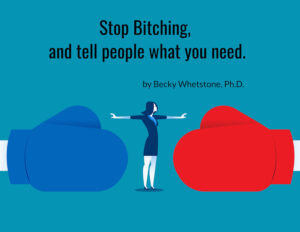They discourage self care and keep us from thriving.
The American culture has dysfunctional beliefs and values that affect and injure us all, and two that have especially limited people’s ability to thrive are the toxin-packed adjectives selfless and selfish. Our society perpetuates the idea that individuals of highest character are those who are selfless, doing absolutely nothing for themselves, and the lowest form, the selfish, because they do. Another word that can go away while we’re at it, is deserve.
As a therapist I see depressed, anxious, depleted clients every day. They weave stories of choices and decisions using terms like:
“This is going to sound really selfish, but I …”, or,
“I know I should just do X, but that’d be selfish/greedy (or put any guilt-provoking term here).”
To get a client to believe that doing for yourself, even being generous to yourself, and saying no to things you would really prefer not doing, is not selfish, but actually healthy and necessary self-care, is one of the steepest hills we’ll climb. Far too many people just won’t buy it because it has been drilled into their heads by numerous sources over many years that it’s wrong to do things just for you, and right to do all you can for others.
The brain-washing messages stream in from family, friends, religion, schools, the media … you should only get things you absolutely need, be pragmatic. Nothing indulgent for you unless you’ve toiled, suffered, sacrificed. “Oh, you took a vacation to Tahiti? Well, you worked so hard last semester with school, community service, nursing a sick family member, and a full time job, you deserve it.”
We’ve learned not to share news of good fortune and self-generosity unless we first mention the suffering that made us worthy of it.
Well, I have news for you — we all deserve trips to Tahiti whether we lift a finger or not, but society says it is pure narcissism, entitlement and self-indulgence to be wonderful to you unless you’ve earned a reward. We are told it is better to give than receive, and when you die, the goal is to be described by all who knew you as a selfless, sacrificing person who has earned an eternal break in heaven.
Emphatically, with all of the passion I can muster, I tell you that those ideas are hideously wrong and misguided. We all “deserve” everything good and wonderful, all the time.
The “suffer for others and give, but never receive” model is a guaranteed recipe for suffering. Self-care, my friends, is the most important thing any person can do, period. Nourishing yourself in mind, body and spirit is the only healthy way to live, keeping yourself filled with the things that bring you joy, pleasure and contentment. This will keep your emotional bank account in the black, leaving you energized and excited about life, and only then will you be able to bring your best self to others, in a moderate balance of playing, sitting, working, pondering, breathing — yes, help others if you can and really want to, then relax and nourish yourself again.
We have to teach ourselves that we were born to want and need things, it’s our nature, and it is OK and innate to want and need things when we’re grown. My rule of thumb is I can do whatever I want so long as it is respectful to myself and my marriage. I tell my clients how I traded in a perfectly good car recently for a tripped-out Jeep that features an electric fold-back roof. This new car makes my heart sing. I did not need the Jeep, I wanted it. It cost a lot, I could afford it and do not need to justify the purchase to anyone. People that attempt to rain on my Jeep parade get met with a, “I love it and it brings me joy,” and that’s all I have to say about it. This concept amazes most, and it’s not the only generous thing I’ll do for myself this year and in the future.
My self-care regime is so good that I end up running around with a sparkle in my eye and bounce in my step, all the result of being so good to myself. I exercise and feed myself healthy foods, that I cook, and my soul loves it. I say no to things that would take my peace away, unless it’s unavoidable like taxes and dental visits. My clients, on the other hand, are miserable because they are trying to be everything to everyone else, and nothing to themselves. They have become human pack mules carrying an impossible load, and give themselves the crumbs of life if there are any left. They don’t get physical checkups often if ever, and they throw filler-filled foods and snacks into their bodies, and quite a few drink, smoke or medicate their miseries away. When family and friend’s expectations and requests come in, they will be there, even if it’s a pain in the backside, they have to drop what they were doing, or costs them financially. They’ll do it even when tired and emotionally spent. Their friends and families know they can count on these people in this way and will take advantage of them and their inability and unwillingness to say no.
What the selfless are not telling you, but they tell me, is they took a day off of work where they are self-employed getting paid per client to accommodate you, then did not make enough to pay all their bills last month. You weren’t the only person they did that for. And why?
“I don’t want to disappoint anyone, people give me grief if I don’t do what they want or need me to do. They say things that make me feel guilty. It’s easier to just do the stuff and be broke and exhausted.”
Do they resent doing all of these things? Absolutely.
One client who couldn’t pay her bills because she was so dedicated to being there for people was told by me that this was her choice to manage her life this way, completely her fault, and not the fault of the people who ask and expect. People can ask for and expect lots of things from me, but they won’t get anything unless I agree, and I won’t agree if it is not healthy for me. Setting boundaries like I do for myself is a crucial part of self care, obviously, but my clients will say that saying no to anyone whether the person is demanding, needing, or wanting is mean, which is another dysfunctional concept that needs to be expunged from our thought processes. The fact is, other adults who can and should be handling their problems need to be, and we need not feel badly about saying no to anyone who is capable of taking care of things themselves.
The people in our lives who would use and abuse us know and use the words and phrases that will feel like a knife to the heart, and every therapist knows that a narcissist will always protest and squeal when their loved ones first set boundaries, but to be healthy and thrive we must do it.
So are there people who are self-oriented to the point of excluding everything and everyone else? Yes! They are probably the ones asking you to do things for them all the time. Enabling them perpetuates it, so just stop.
So, who do we call to expunge the words selfish, selfless and deserve from our language? I don’t know, but in my office it starts by calling my clients out every time they say them, forbidding them to utter them in my office, and talking about this subject in social and formal conversations whenever I can. My guess is that dedicating yourself to not using them will feel like the removal of handcuffs, and I can’t think of a better way to begin the practice of self care.






 Becky Whetstone is an Arkansas native and has a Ph.D. in Marriage and Family Therapy from St. Mary’s University in San Antonio, Texas. She is a Licensed Marriage and Family Therapist (LMFT) in Texas and Arkansas.
Becky Whetstone is an Arkansas native and has a Ph.D. in Marriage and Family Therapy from St. Mary’s University in San Antonio, Texas. She is a Licensed Marriage and Family Therapist (LMFT) in Texas and Arkansas. 





















































































































